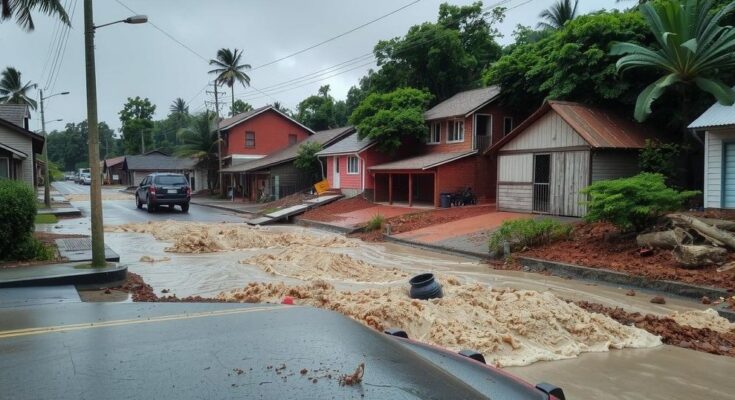Mayotte is experiencing severe flooding and mudslides from Storm Dikeledi, just a month after Cyclone Chido devastated the islands. Authorities have issued the highest alert level, as heavy rains threaten further destruction. Approximately 14,500 people are in emergency shelters, and while the storm moves away from Mayotte, the long-term impacts of such storms on the local population remain significant.
The French overseas territory of Mayotte is currently grappling with severe flooding and mudslides, causing significant disruption just one month following the devastation wrought by Cyclone Chido, which resulted in numerous fatalities. As the second storm, named Dikeledi, passed near the islands, authorities have enacted the highest alert level in anticipation of strong winds, flash floods, and landslides. Reports indicate widespread damage across the territory, including significant flooding in the previously untouched village of Mbouini.
Dikeledi made landfall in northern Madagascar, claiming at least three lives before advancing toward Mayotte where it came within 100 kilometers. The prefect of Mayotte, François-Xavier Bieuville, noted that the territory is experiencing the onset of extremely heavy rains, resulting in early-stage flooding and considerable mudslides. Approximately 14,500 individuals have sought refuge in emergency shelters set up to ensure their safety as the region braces for continuing severe weather.
As forecasted, the island will likely remain under red alert through Monday evening, with expectations of sustained heavy rainfall even post-storm. While Dikeledi is forecasted to strengthen into a tropical cyclone over the next day as it approaches Mozambique, authorities predict that the system will not make landfall on the mainland.
Notably, Mayotte, characterized by significant poverty, has a resident population officially estimated at 320,000, compounded by an estimated 100,000 to 200,000 undocumented migrants. The catastrophic impact of Cyclone Chido, which struck the region on December 14, 2022, remains prevalent, having been marked historically as the most devastating storm in nine decades, with initial death toll estimates significantly revised from hundreds to an eventual 39 casualties.
Mayotte, a small archipelago located in the Indian Ocean, is a French overseas territory that has faced repeated natural disasters, most notably Cyclone Chido, which resulted in extensive human and infrastructural losses. The archipelago struggles with poverty and has a complex demographic situation, with a significant population of undocumented migrants. Recently, another storm, Dikeledi, has exacerbated these challenges, bringing yet more rain and threats to an area still recovering from the prior catastrophe. The region’s vulnerability to severe weather patterns has reignited concerns regarding preparedness and resilience for future storms.
In summary, Mayotte is currently facing dire circumstances due to flooding and mudslides triggered by Storm Dikeledi, compounding the aftermath of Cyclone Chido. The territory, under the highest state of alert, is grappling with the consequences of successive storms while a significant number of residents remain displaced. The ongoing recovery efforts underline the urgent need for improved disaster preparedness in a region marked by socioeconomic challenges and complex demographic dynamics.
Original Source: www.bbc.com




